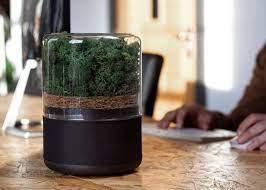In a world where environmental concerns are at the forefront of public consciousness, individuals are increasingly seeking ways to adopt sustainable practices in their everyday lives. From reducing plastic usage to embracing renewable energy sources, the pursuit of eco-friendly living has become a global movement. One often-overlooked aspect of sustainable living is indoor air quality, which can significantly impact our health and well-being. As awareness grows about the detrimental effects of air pollution on both human health and the environment, the demand for air purifiers as a solution has surged. In this article, we explore the intersection of cleaner living and air purification technology, highlighting the benefits of incorporating air purifiers into sustainable lifestyles.
Understanding Indoor Air Quality
Indoor air quality refers to the level of pollutants present in the air inside buildings and structures, including homes, offices, and public spaces. Common indoor pollutants include particulate matter, volatile organic compounds (VOCs), allergens, and other airborne contaminants. Sources of indoor air pollution range from outdoor pollutants entering indoor spaces to indoor activities such as cooking, cleaning, and smoking. Prolonged exposure to poor indoor air quality can lead to a variety of health problems, including respiratory issues, allergies, and exacerbation of existing medical conditions.
The Role of Air Purifiers
Air purifiers are devices designed to remove pollutants and improve indoor air quality by filtering out harmful particles and contaminants. These devices typically employ a combination of filtration technologies, including High-Efficiency Particulate Air (HEPA) filters, activated carbon filters, and UV-C light sterilization, to capture and neutralize pollutants. By circulating and purifying the air in enclosed spaces, air purifiers help reduce the concentration of indoor pollutants, creating a healthier and more comfortable environment for occupants.
Benefits of Air Purifiers in Sustainable Lifestyles
Incorporating air purifiers into sustainable lifestyles offers several benefits that align with the principles of environmental conservation and eco-conscious living:
-
Reduced Environmental Impact: Air purifiers can help minimize the environmental impact of indoor air pollution by reducing the need for chemical-based air fresheners and cleaning products. By purifying the air naturally, air purifiers promote a healthier indoor environment without relying on harmful chemicals that can contribute to outdoor air pollution and environmental degradation.
-
Energy Efficiency: Many modern air purifiers are designed to operate efficiently, consuming minimal energy while effectively purifying the air. By choosing energy-efficient air purifiers with low power consumption, individuals can reduce their carbon footprint and contribute to energy conservation efforts.
-
Long-Term Health Benefits: Investing in air purifiers can lead to long-term health benefits, including reduced risk of respiratory illnesses and improved overall well-being. By removing airborne pollutants and allergens from indoor spaces, air purifiers help create a healthier living environment, supporting sustainable health practices and reducing reliance on medical treatments.
-
Promotion of Sustainable Practices: Incorporating air purifiers into sustainable lifestyles encourages greater awareness of indoor air quality and its impact on health and the environment. By prioritizing indoor air quality management, individuals can adopt sustainable practices that contribute to the preservation of natural resources and the promotion of environmental stewardship.
Choosing Sustainable Air Purifiers
When selecting air purifiers for sustainable living, consider the following factors to ensure optimal performance and environmental responsibility:
- Energy Efficiency Ratings: Look for air purifiers with Energy Star certification or other energy-efficient ratings to minimize energy consumption and reduce environmental impact.
- Filter Replacement: Choose air purifiers with washable or reusable filters to reduce waste and minimize the need for frequent replacements. Alternatively, opt for models with recyclable filter components to support eco-friendly disposal practices.
- Natural Filtration Technologies: Select air purifiers that utilize natural filtration technologies, such as HEPA filters and activated carbon, to avoid exposure to harmful chemicals and synthetic materials.
Conclusion
Incorporating air purifiers into sustainable lifestyles offers a holistic approach to improving indoor air quality while promoting environmental responsibility and eco-conscious living. By investing in energy-efficient air purifiers with natural filtration technologies, individuals can create healthier indoor environments while minimizing their environmental footprint. As awareness of the importance of indoor air quality continues to grow, integrating air purifiers into sustainable living practices becomes increasingly essential for fostering cleaner, healthier, and more sustainable lifestyles.
By embracing air purification technology as a key component of sustainable living, individuals can contribute to a cleaner, healthier planet for future generations while enjoying the immediate benefits of improved indoor air quality and well-being.

